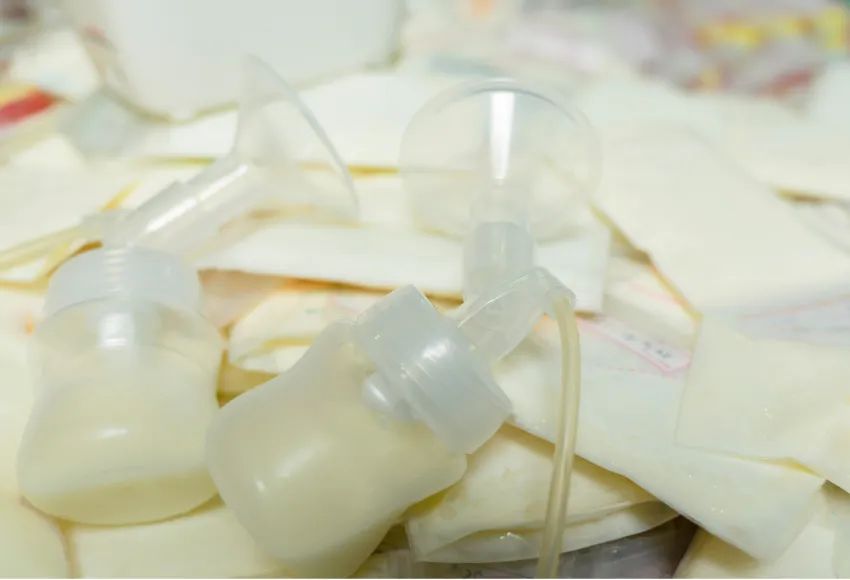

what is colostrum?
Is it safe to express before the baby is born
If you’re pregnant and planning to breastfeed, you may have heard of colostrum—often called “liquid gold.” This nutrient-rich first milk is available just before and in the first few days after birth, before mature breast milk comes in. It’s typically thicker and more yellow in color, and it’s packed with protein and immune-boosting properties.
Colostrum provides all the nutrients and fluids your newborn needs in the early days and plays a vital role in supporting their developing immune system. During pregnancy, the breasts naturally begin producing small amounts of colostrum.
Some people may notice it leaking onto their bra or clothing, while others may not see any visible signs. Both are completely normal.
.png?fit=outside&w=850&h=580)
Antenatal Expression: Preparing Ahead
“There’s a growing trend among expectant parents to express and freeze colostrum before delivery,” said Bri Downs, RN, a lactation consultant at Intermountain Health St. Vincent Regional Hospital. “While most babies will not need the extra supplementation, it is a great way to practice hand expression and prepare if your baby does need supplementation after birth. This will give you the opportunity to offer your own milk instead of formula or donor milk, however, it’s important to do it safely.”
Most babies don’t need extra colostrum, but for those with certain medical conditions, early supplementation can be helpful. Babies who may benefit include:
- Infants born to mothers with type 1 or gestational diabetes
- Babies with high bilirubin levels (jaundice)
- Small or large for gestational age infants
- Premature babies or those in the neonatal ICU
- Babies with weight loss greater than 10% in the first two days
- Multiples (twins, triplets, etc.)
Can Expressing Colostrum Trigger Labor?
“Expressing breast milk or colostrum before labor can stimulate the release of oxytocin, a hormone involved in both milk letdown and uterine contractions,” said Downs. “Because of this, there’s a small possibility it could trigger labor—especially if your body is already close to being ready.” That’s why it’s important to follow safe guidelines.
Tips for Safe Colostrum Expression
- Wait until at least 37 weeks of pregnancy before expressing
- Use hand expression, which is the most common method
- Ask your provider for guidance or instructional videos
- Stop immediately if you experience cramping or abdominal pain
- Consult with your provider before expressing if you have a history of preterm labor or high-risk pregnancy
“Learning how to hand express before or right after birth can help increase your chances of exclusively breastfeeding during those important first three months,” said Downs. “Your newborn’s stomach is tiny, just ½ to 2 teaspoons of colostrum per feeding is what they will need in the first 24 hours. Hand expression is also a good way to make you feel empowered in your feeding journey.”
How to Store and Use Colostrum Safely
Before bringing frozen colostrum to the hospital, check with your facility to confirm they can accommodate freezer storage, as not all hospitals have this capability. Keep the colostrum frozen until delivery, storing it in a capped syringe with space left for expansion. Each container should be labeled with the date and time of expression.
Once thawed, colostrum must be used within 24 hours. Wishing you a smooth and joyful delivery—you're doing an amazing job preparing ahead!
To learn more about the birthing options at Intermountain Health St. Vincent Regional Hospital, visit our website or call 406-248-3607.
More from the Experts at St. Vincent Regional Hospital
About St. Vincent Regional Hospital
Founded on our mission of compassionate care 125 years ago, St. Vincent Regional Hospital, part of Intermountain Health, has grown into one of Montana’s largest comprehensive hospitals, serving the healthcare needs of over 400,000 people in our four-state area. Continuing to respond to the needs of our community, we have been recognized as an innovator in trauma, heart, neurological and cancer care. At St. Vincent and Intermountain Health, our 12 primary care clinics, and specialty clinics in and around the Billings area, our goal is to help you live the healthiest lives possible. This also includes caring for the region's youngest patients. We opened the region's first Pediatric Intensive Care Unit staffed 24/7 by Pediatric Intensivists and the only Pediatric Surgery program serving eastern Montana, northern Wyoming, and the western Dakotas.
125 Years of Caring for You
St. Vincent is proud to be Billings' first hospital, caring for generations in our community. Hear the story of how a group of brave Catholic sisters brought healthcare to Billings and how we continue our mission to help you live your healthiest life. Click HERE to watch.









































